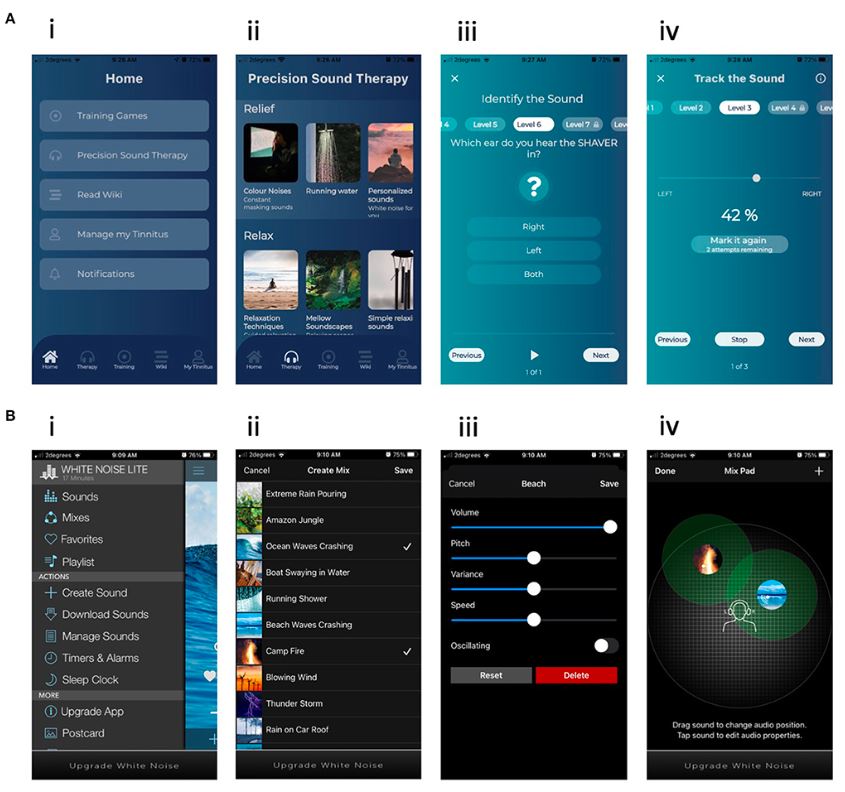Tinnitus-Curing Smartphone App Prototype Developed by University of Auckland
Innovative Mobile Application Prototype For The Treatment Of Tinnitus Has Been Developed by Grant Searchfield, Associate Professor of Audiology & Tinnitus Expert

The University of Auckland has reported encouraging findings from a clinical trial of a novel mobile-phone-based therapy, following a 20-year quest to discover a remedy for tinnitus. In this study, a total of 61 patients were randomly assigned to receive either the prototype of a novel ‘digital polytherapeutic’ or a commonly used self-help application that generates white noise.
According to the findings of a study that was recently published in the journal Frontiers in Neurology, only the group that received the polytherapeutic treatment (consisting of 31 individuals) had clinically meaningful improvements after 12 weeks, whereas the other group (consisting of 30 individuals) did not. Researchers are excited because they feel that this innovation could have a direct impact on the treatment of tinnitus in the future as a result of these optimistic results.
Tinnitus is a prevalent medical condition that affects roughly 15% of the population. Among them, about 1% of individuals experience severe symptoms that significantly affect their quality of life. The condition under consideration is distinguished by the presence of a continuous auditory perception of ringing, buzzing, or humming in the ears, which can cause significant distress and prove to be a formidable challenge to effectively address. At present, the medical community has not discovered a definitive cure for tinnitus, and available interventions are primarily focused on symptom management.
Over the last twenty years, a global community of researchers has been actively investigating potential treatments for tinnitus, yielding modest results thus far. The clinical trial conducted at the University of Auckland has presented a promising outlook for individuals afflicted with the aforementioned condition.
What this therapy does is essentially rewire the brain in a way that de-emphasizes the sound of the tinnitus to a background noise that has no meaning or relevance to the listener,” Dr. Searchfield says.
According to audiology research fellow Dr. Phil Sanders, “Sixty-five percent of participants reported an improvement. For some people, it was life-changing – where tinnitus was taking over their lives and attention.”
Grant Searchfield, an associate professor of audiology and a tinnitus expert with more than 20 years of experience, directed the study. Professor Searchfield claims that the trial was created to evaluate a novel mobile phone-based therapy that targets a number of elements that contribute to the disease.
The proposed ‘digital polytherapeutic’ prototype is a multifaceted intervention that integrates various therapeutic modalities, such as cognitive-behavioral therapy, sound therapy, and mindfulness techniques. The delivery of therapy is facilitated through a mobile application, which can be tailored to cater to the unique requirements of every patient.
In order to evaluate the efficacy of the therapy, a randomized controlled trial was conducted by the research team. The trial included 61 participants who were diagnosed with tinnitus and were randomly assigned to either the polytherapeutic treatment or a self-help application that produces white noise and is widely used. Assessments were conducted on the participants at 4, 8, and 12 weeks post-treatment initiation.

The findings of the research exhibited a high degree of promise. At the 12-week mark, the cohort receiving polytherapeutic treatment exhibited noteworthy clinical enhancements, whereas the other cohort did not demonstrate similar progress. The study revealed notable enhancements in tinnitus severity, mental health, and quality of life.
“This is more significant than some of our earlier work and is likely to have a direct impact on future treatment of tinnitus,” said Associate Professor in Audiology Grant Searchfield.
The findings of the study have elicited enthusiasm among medical professionals, who hold a positive outlook regarding the potential of the novel therapy to serve as a significant advancement in the management of tinnitus.
The research was funded by the University of Auckland and Tinnitracks, a German-based enterprise that specializes in digital therapeutics for tinnitus. The Tinniwell platform, utilized in the study, was developed by Tinnitracks. This platform is an extension of their pre-existing Tinnitracks therapy, with supplementary features and improvements tailored to the New Zealand market.
Check Out: Conscientiousness Coach App: Aims To Help Multiple Sclerosis Patients To Avoid Cognitive Decline
PTA Taxes Portal
Find PTA Taxes on All Phones on a Single Page using the PhoneWorld PTA Taxes Portal
Explore NowFollow us on Google News!

